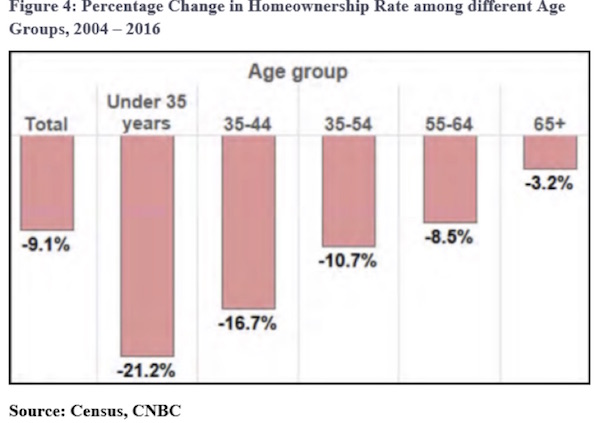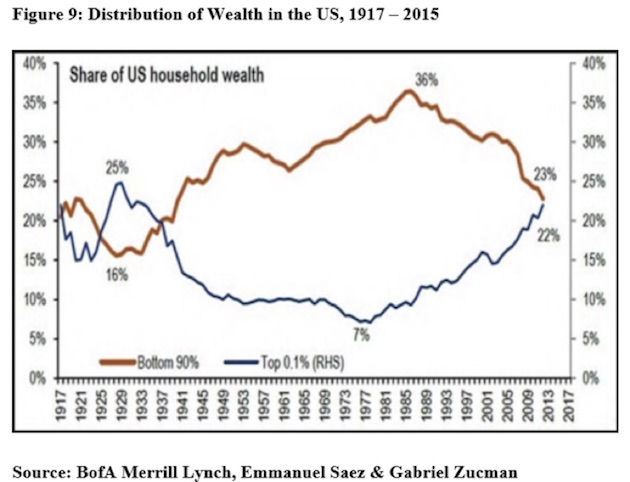I need to clarify the point that, “for workers between 22 and 34, rent costs now claim upward of 45 percent of income in Los Angeles, San Francisco, New York, and Miami.” This is certainly true, but in New York, the median rent-to-income ratio or the share of total household income necessary to pay median asking rent is frequently above 50% (see Figure 5). So when Joel Kotkin writing for dailybeast.com says that,
Like medieval serfs in pre-industrial Europe, America’s new generation, particularly in its alpha cities, seems increasingly destined to spend their lives paying off their overlords, and having little to show for it. No wonder that rather than strike out on their own, many millennials are simply failing to launch, with record numbers hunkering down in their parents’ homes. Since 2000, the numbers of people aged 18 to 34 living at home has shot up by over 5 million
– he is spot on. Since the homeownership rate peaked out in the US in late 2004, the biggest drop has come from households under the age of 35.

Kotkin then explains that a common theme in the mainstream media is that millennials don’t want to buy homes. The new generation, it is said is part of “an evolution of consciousness” – whatever that means is beside the point. Other observers claim that the young have embraced “the sharing economy,” so that owning a home is simply not to their taste. I have also seen financial advisors recommending young people not to buy a home because home prices have increased far less than an investment in equities over time despite the fact that until recently, gains in US housing were matching those of the equity markets toe to toe since 2011 bottom in US house prices.
However, according to Kotkin,
[It] is “not a lifestyle choice but economics – high prices and low incomes – – that are keeping millennials from buying homes. In survey after survey the clear majority of millennials – roughly 80%, including the vast majority of renters – express interest in acquiring a home of their own. Nor are they allergic, as many suggest, to the idea of raising a family, albeit often at a later age, long a major motivation for home ownership. Roughly 80% of millennials say they plan to get married, and most of them are planning to have children. Overall, more than 80 percent of millennials already live in suburbs and exurbs, and they are, if anything, moving away from the dense, expensive cities. Since 2010 millennial population trends rank New York, Chicago, Washington, and Portland in the bottom half of major metropolitan areas while the young head out to less expensive, highly suburbanized areas such as Orlando, Austin, and San Antonio.
… In this respect what is interesting is that whereas Mr. Trump was elected (partly) because he promised to improve the condition of the American worker, since his election the 0.1% have gained the most as the stock market capitalization has increased by over $2 trillion. Therefore, by now the wealth of the top 0.1% should exceed the wealth of the bottom 90% for the first time since 1941. Remarkably, the recent pronouncements by Trump and coterie suggest that they equate the stock market strength with a strong economy as well….

Surely the millennials grew up in a more affluent and more “take it easy” environment than the boomers who were brought up by a generation of parents that had experienced the hardship of depression years and the horrors of the Second World War. The millennials’ parents were mostly frugal, debt averse because of the experience of the depression where indebted households lost everything (just like in 2008/2009), and they had a high saving rate.
Therefore, compared to the boomers it is only natural and completely understandable that the millennials’ drive for achievement and thriftiness are inferior to the one that their parents had. But can the relative decline of the financial condition of the millennials be satisfactorily explained by their less entrepreneurial spirit?
The Complacent Class
In “Dreaming Small – Is America Losing the Restlessness of Spirit That Once Powered Its Economy?” Edward Luce reviews Tyler Cowen’s book The Complacent Class: The Self-Defeating Quest for the American Dream. (See Financial Times, February, 17, 2017.)
Luce does not only write perfect English but also describes cynically how today’s society functions by quoting Cowen extensively. He writes:








